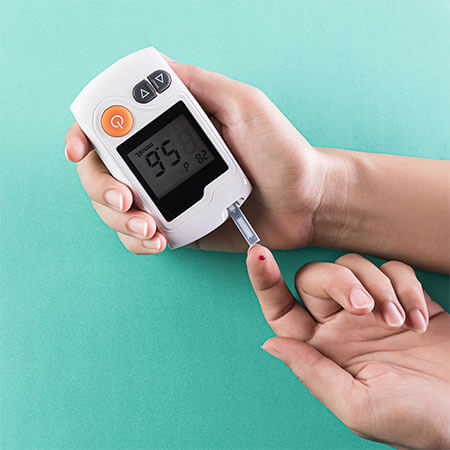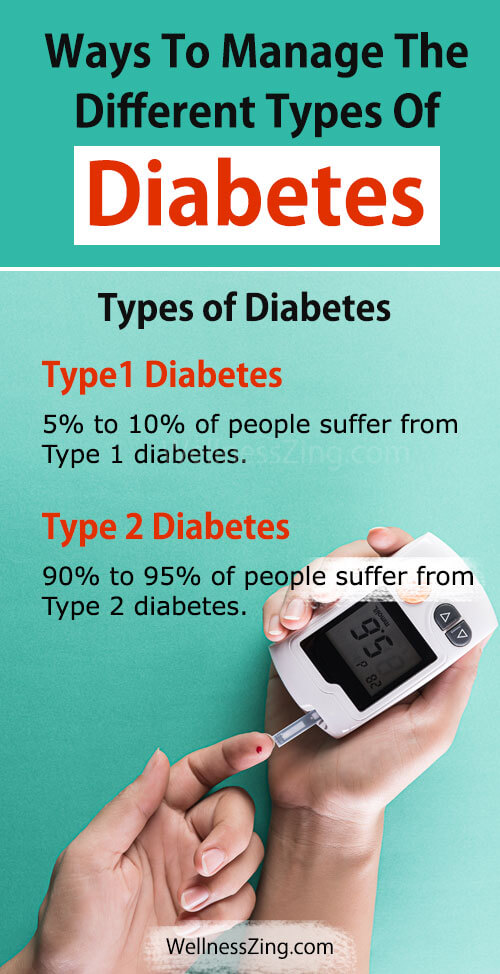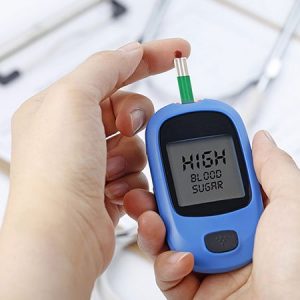Diabetes is one of the inflammatory ailments that has no permanent cure. Once a person is diagnosed with this problem, then it stays with him for a lifetime. There are measures by which you can control it and live a normal and active life. If you are newly diagnosed, or have been struggling with Type 1 or Type 2 diabetes, then this article will equip you with all the necessary information that you would need to lead a healthier life. We are going to share with you all those tools, food ideas, and lifestyle tips to manage this disease effectively.
About Diabetes
Based on the study, it has been found that around 5% to 10% of people suffer from Type 1 diabetes, and nearly 90% to 95% percent suffer from Type 2 diabetes. Another 83 million people in the world are diagnosed with prediabetes.
Types of Diabetes
Diabetes can happen due to a group of issues i.e., when the body lacks the ability to synthesize adequate amount of insulin in the body, or shows inability to use the insulin properly, or both. Due to these inabilities, it fails to provide sugar to the various cells of the body for generation of energy. This sugar remains in the bloodstream and leads to a drastic rise in the blood glucose levels.
The main reason behind the building up of sugar in the body is due to either resistance to insulin, or lack of adequate amount of insulin in the body.
Diabetes is often classified into three main types:
- Type 1 diabetes
- Type 2 diabetes
- Gestational diabetes
Type 1 Diabetes
Type 1 diabetes can occur in any person of any race, and at any age. It occurs when your body doesn’t synthesize adequate levels of insulin.
Our body metabolize the carbohydrates in the food into sugar and it gets mixed into the bloodstream. The cells of the body require this sugar to produce energy and perform cellular functions in the body. Insulin is the hormone that is responsible for drawing sugar from blood and providing it to cells to perform the necessary task. In case of Type 1 diabetes, your body lacks insulin hormone, or is resistant towards it. Due to this reason, sugar remains in the blood, and cells are depleted from adequate amount of sugar to generate energy.
In people suffering from Type 1 diabetes, insulin therapy and a few other treatments are provided to help people manage their health condition and live long and healthy life. A healthy lifestyle with proper diet, and exercise can effectively manage this condition.
Type 2 diabetes
Type 2 diabetes is the commonest type of diabetes. It implies that your body is not able to use insulin hormone to the best of its capabilities. Fitness, and diet are the two crucial factors that can treat this disease.
People who suffer from Type 2 diabetes are advised to follow a restricted diet to promote adequate glucose levels in the blood. Exercise, and well-balanced diet with external insulin hormone therapy, and medication all will help in effective management of the disease.
Gestational diabetes
Gestational diabetes is a type of diabetes that happens in women during pregnancy. Like other types of diabetes, this condition is also manageable. When the baby is in the womb of mother, she gets the nutrition through the placenta that works as a connecting tube between her, and the mother.
In some cases, these hormones hinder the functionality of the insulin of the mother and causes “insulin resistance” in the body. As a consequence, it makes it difficult for the mother to make full use of her insulin hormone. In such a scenario, the mother needs insulin supplements to compensate the low levels in the body.
Gestational diabetes, when treated at the early stages can save the baby from adverse effect. With assistance of your doctor, regular physical activity, and specialized meal plans, you can manage blood glucose levels in the body. With daily blood glucose testing and taking insulin injections, you can be rest assured of a healthy pregnancy and baby.
What is Prediabetes?
There are no clear symptoms of prediabetes. It is viewed as a warning sign of getting diabetes in future. This condition happens when the levels of glucose in blood is higher than its permissible levels but not as high to cause diabetes. These are the people who have diabetes running in their family. In these people, you may find many symptoms that resembles with diabetes.
It is important to get serious at the initial stage. Get consultation from the doctor and perform the necessary tests that he advises you to undergo to monitor your blood sugar levels, urine protein, cholesterol, and blood pressure. Follow the diet plan, and exercise routine diligently along with the treatment as prescribed by the doctor.
Causes of different types of Diabetes
One of the best ways to protect yourself from diabetes, is to prevent it to happen at the first place. By learning about its causes, you can easily avoid them, and keep this disease at bay.
1. Type 1 Diabetes
Type 1 diabetes is an autoimmune condition that implies that the body’s own immune system starts to attack itself by mistake. It kills the beta cells in the pancreas that synthesize insulin hormone in the body. The destruction that is caused to the body in this case is irreversible. Genetics, and environment factor play a major role in contributing to this disease.
2. Type 2 diabetes
The major cause behind Type 2 diabetes is “insulin resistance” that causes the sugar levels in the blood to increase. Due to this reason, the body stimulates the pancreas to secrete more amount of insulin. When the body fails to produce the desired amount of insulin hormone, it results in unmanageable levels of sugar in blood.
Here is the list of factors that contribute towards causing of Type 2 diabetes:
- heredity
- sedentary lifestyle
- being obese or overweight
- environmental factor
- Gestational diabetes
Gestational diabetes happens in pregnant women when the body of mother starts to produce insulin-blocking hormones in the pregnancy.
Symptoms of different Types of Diabetes
The sooner you diagnose diabetes and start its treatment, the better chances you have to cure it before it becomes incurable. Be watchful of these symptoms as it can indicate that you may have diabetes.
Type 1 Diabetes
Type 1 diabetes is mostly seen to happen in children and youths. This type of diabetes develops quickly and can result in following symptoms –
- diabetic ketoacidosis, when you lose substantial body weight due to no insulin production, and high blood sugar in the body. This is seen even in those people who eat more.
- frequent urination
- feeling very thirsty and hungry, even if you are drinking water, and eating at periodic intervals of time
- fatigue
- unclear vision
- slow wound healing
Type 2 Diabetes
This type of diabetes was earlier prominent in people who were over the age of 45 years. However, due to sedentary lifestyle, and unhealthy eating, younger people are also getting diagnosed with the disease. People who are overweight, live a sedentary lifestyle, and/or have gestational, or prediabetes are at high risk of developing Type 2 diabetes
Some of the symptoms of this condition are as follows –
- weight gain,
- dark patches in the neck, and in armpits
- numbness/pain in the feet or hands
Gestational Diabetes
Some of the symptoms of this disease are –
- excessive hunger and thirst
- feeling an urge to urinate quite often
- drowsiness
- excessive tiredness
- skin becoming itchy, and dry
- unclear vision
- wounds take time to heal
Possible Complications of Diabetes
Complications of diabetes develop with time. Poorly managed levels of blood glucose can increase the chances of life-threatening complications in the body. The risk of these complications will reduce if diabetes is diagnosed and treated early. Some of the serious complications that you can develop in later stages of diabetes:
- blood vessel ailment that leads to stroke, and heart failure
- eye problems, or retinopathy
- skin conditions, or infection
- neuropathy or damage to nerves
- nephropathy, or damage to kidney that may require a kidney transplant or dialysis to treat it.
- amputations due to neuropathy
- foot related issues
- erectile dysfunction or vaginal dryness
- development of Alzheimer’s disease
In case of gestational diabetes, high blood glucose levels in pregnancy can cause harm to child, and mother in following ways:
- preeclampsia
- miscarriage
- high blood pressure
- birth defects
- stillbirth
Treatment Of Different Types Of Diabetes
Irrespective of the type of diabetes, you will need to get consult with the doctor on regular basis to manage it. The primary objective is to keep blood sugar levels within the permissible levels. Based on the type of diabetes, risk of complications, and age, he will arrive at a personalized treatment.
Physical activity is very important aspect for the management of diabetes. Ask the doctor about the type of exercises, and for how much time do you need to perform them to achieve your health goals.
Diet is another critical aspect to consider to control and manage diabetes. Your healthcare provider may advise you to consult a dietician, or prescribe a diet plan to help you maintain right levels of blood sugar. Along with blood sugar, you will also be required to monitor cholesterol, and blood pressure in the body to effectively manage this condition.
Treating Type 1
As in this type of diabetes, pancreas is permanently damaged, so there is no natural secretion of insulin in the body. People have to rely on external supplementation of insulin hormone. Depending on the peak, duration, and onset, doctor may prescribe you the type of insulin hormone.
Insulin can be given via an injection or by using an insulin pump that is worn on the body. Depending on the insulin requirement, you can program this device to release specific dose of insulin in the body.
Also, to ensure that your blood sugar levels are within control, you can check it using blood glucose monitors throughout the day. You can find them easily at local and online medical stores. If you have existing high blood pressure, cholesterol and other issues, then he may also prescribe you some medicines to treat those conditions.
Treating Type 2
The best way to manage Type 2 diabetes is through a combination of daily aerobic exercise, right diet, medications and regular check-ups is needed to keep your blood sugar in check. In this case of diabetes, your body generates insulin but is not able to use it properly.
To assist the body to make an effective use of insulin, your doctor may prescribe you medicines, like metformin. Like in case of Type 1 diabetes, you need to continuously evaluate blood glucose levels in the body. Depending on your existing health condition, you may even require medicines to control cholesterol, and blood pressure.
Prevention of Diabetes
There is nothing that you can do to prevent the onset of Type 1 diabetes. Once you get this disease, you will learn to live with it for a lifetime.
You can reduce the risks associated with Type 2 diabetes by:
- controlling your body weight
- managing diet
- daily exercise
- avoiding smoking, and alcohol
- monitoring your triglycerides, and cholesterol levels regularly and keeping them within safe limits
The above habits will definitely prevent the occurrence of Type 2 diabetes, prediabetes, and gestational diabetes.
Ways to Control and Manage Diabetes
Diabetes is not unmanageable. There are certain things that you can do to manage your health and live a normal, and active life. Let us know what they are.
1. Be informed
You need to consult doctors, diabetes educators, dietitians etc. to know how to manage the condition and what changes to bring into the lifestyle to take care of yourself. They will look into the severity of the condition, and advice you a diet plan, exercise schedule, and medical treatments as required.
2. Be mindful of your other body organs
Diabetes can affect your nerves, eyes, teeth, heart and other parts of the body. It is important to stop these complications before they even start. For this, you will need to closely monitor the condition of these organs. To get a precise idea, you will require to perform below tests:
- A1c test that measures the average blood glucose levels over the last three months.
- Check your blood pressure at least twice a year. High blood pressure is responsible for causing serious conditions.
- Check your cholesterol levels as high levels can makes you prone to heart ailment, and strokes. You must get yourself tested twice a year.
- Check your urine protein. There is a test called “microalbumin” that helps you check its level. Doctors generally prescribe this test for diabetes patients. Ensure that you perform this test regularly twice a year.
- Get your eyes checked twice a year
- Get your foot examined as numbness and tingling sensation in the feet are one of the complications of diabetes.
- Visit a dentist to get your teeth checked twice a year
- Get annual vaccinations
In addition to regular check-ups, pay attention to diet, exercise, and medication to stay safe from these complications.
Lifestyle Changes to Manage Your Diabetes
So, here are some key ways by which you can bring positive changes in your lifestyle and manage diabetes.
- Eat only healthy food. Eat a lot of fresh and seasonal produce in terms of fruits, and vegetables. Eat nuts, seeds, whole grains, lean meat, and nonfat dairy products. Limit junk, refined and processed foods that have high fat, calories and sugar in it.
- As carbohydrates metabolize into sugar, you should control your carb intake. Consume carbs that have low GIycemic Index or that slowly releases sugar in the bloodstream. Include slow digesting complex carbohydrates in your meal. Take help of the doctor or dietician to work out on your diet schedule.
- Exercise. Exercise is very important to maintain the safe levels of blood glucose in the body. It also helps you manage body weight, and release stress from the body that are an added advantage in diabetes. Daily forty minutes of aerobic exercises should be performed.
- Manage your stress levels. Stress is one of causes for high blood sugar levels. Therefore, it is very important to manage it. Exercise, deep breathing, meditation, yoga, or any creative activity like dancing, music etc. will relax you.
- Abstain from smoking and alcohol: Both smoking, and alcohol consumption can contribute to diabetes. It can cause extreme fluctuations in blood glucose levels i.e., from very high or very low. If you can’t stop alcohol consumption completely, then do not consume beyond two drinks a day (in case of men), and one drink a day (in case of women).
Conclusion
Unfortunately, there is no permanent cure for type 1 diabetes. It is a lifelong management. With the availability of several treatment options, you can still live the life of your dreams. All it takes is consistent monitoring and sticking to the treatment and avoiding things that can lead to serious complications of the ailment. By working closely with the doctor and incorporating good lifestyle choices, you can successfully manage diabetes.
If you liked this post, then do share it with your friends on social media. Also, you can write to us any of your queries, suggestions, and comments. We will be happy to address them soon.



















